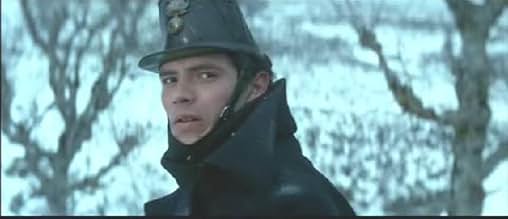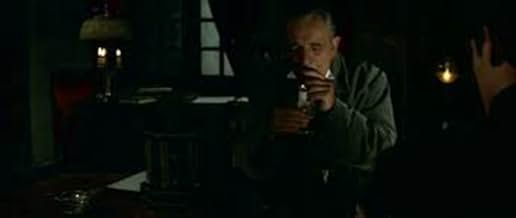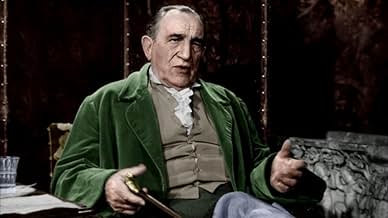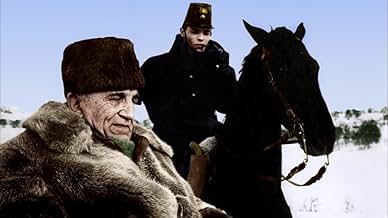Un roi sans divertissement
- 1963
- Tous publics
- 1h 25min
NOTE IMDb
7,0/10
295
MA NOTE
Un policier et un tueur en série se lancent dans une course-poursuite dans un village de montagne isolé au XIXe siècle en France.Un policier et un tueur en série se lancent dans une course-poursuite dans un village de montagne isolé au XIXe siècle en France.Un policier et un tueur en série se lancent dans une course-poursuite dans un village de montagne isolé au XIXe siècle en France.
- Réalisation
- Scénario
- Casting principal
Avis à la une
This is François Leterrier's second film ,and along with his first effort "Les Mauvais Coups" ,it can be considered his best.The rest of his career,with the eventual exception of "Projection Privée" is almost worthless ("Emmanuelle","Va Voir Maman Papa Travaille" ).It's extraordinary he fell so quickly after his ambitious debut.
"Un Roi Sans Divertissement" is an anomaly in the French sixties.It has nothing to do with the nouvelle vague (who said fortunately?) and nothing to do with the old one either.Its cast is bizarre:Claude Giraud,de la Comedy Française, was essentially a stage actor,mainly known for a supporting part in the "Angelique Marquise des Anges " saga and Colette Renard was a singer , an occasional actress.Charles Vanel was the only household name ( "Le Salaire de la Peur" ,"Les Diaboliques" and "To catch a Thief").A Jacques Brel song (not intended for the film) "Pourquoi Faut -il Que Les Hommes S'Ennuient?" "(=why must men be bored?)is heard during the credits .
A rural thriller involving a serial killer ,a "man like you and me" ,an officer who investigates in a small village surrounded by snow ;he is housed in a middle age woman's café (who was once a madam). The screenplay displays weaknesses -it's difficult to believe the final behavior of the hero-and the dialog is too poetic,too literary. Jean Giono was more convincing when he showed his pacifism in other works than when he tries his hand at metaphysical considerations.
What is really fascinating is the cinematography ,the atmosphere which the director creates: the search in the snow where human people look like giant insects from a distance ,a search which looks like an entertainment:the moment when they share a delicious chef's special paté is revealing.Sometimes the picture almost turns black and white.And I've rarely seen a more inventive way of filming a church.
"Un Roi Sans Divertissement" is an anomaly in the French sixties.It has nothing to do with the nouvelle vague (who said fortunately?) and nothing to do with the old one either.Its cast is bizarre:Claude Giraud,de la Comedy Française, was essentially a stage actor,mainly known for a supporting part in the "Angelique Marquise des Anges " saga and Colette Renard was a singer , an occasional actress.Charles Vanel was the only household name ( "Le Salaire de la Peur" ,"Les Diaboliques" and "To catch a Thief").A Jacques Brel song (not intended for the film) "Pourquoi Faut -il Que Les Hommes S'Ennuient?" "(=why must men be bored?)is heard during the credits .
A rural thriller involving a serial killer ,a "man like you and me" ,an officer who investigates in a small village surrounded by snow ;he is housed in a middle age woman's café (who was once a madam). The screenplay displays weaknesses -it's difficult to believe the final behavior of the hero-and the dialog is too poetic,too literary. Jean Giono was more convincing when he showed his pacifism in other works than when he tries his hand at metaphysical considerations.
What is really fascinating is the cinematography ,the atmosphere which the director creates: the search in the snow where human people look like giant insects from a distance ,a search which looks like an entertainment:the moment when they share a delicious chef's special paté is revealing.Sometimes the picture almost turns black and white.And I've rarely seen a more inventive way of filming a church.
I was unfortunate to see this after I read the actual book, and it was a huge disappointment.. The story is different, the plot overly simplistic, most of the characters have lost their depth and complexity and charm. In some cases they have literally been changed. The entire message is spelled out all too clearly.
The weird thing is that the author Jean Giono actually wrote the script. I really don't understand what made him destroy his own book like this. Because it's a decent enough book, with some good points and and interesting story.
No. I didn't like it at all.
The weird thing is that the author Jean Giono actually wrote the script. I really don't understand what made him destroy his own book like this. Because it's a decent enough book, with some good points and and interesting story.
No. I didn't like it at all.
I have just seen a french DVD copy of this film. It is one of the most interesting thrillers I've seen in along time. The visuals are astonishing and the dialogues are as sophisticated as you would expect from someone like Giono. The concept is fascinating: a policeman and a serial killer play cat and mouse in an isolated mountain village in Nineteenth century France. Unlike most thrillers, there is no psychological explanation of the killer's motives, but a metaphysical, existential reflection of the nature of murder, which can be considered highly original, and at least as immoral as De Quincey's thesis.
It is clear that this film was a heavy influence on Chistophe Gans' "Brotherhood of the wolf", although I would suggest that the unexpected (yet totally coherent) twist at the ending has been copied in many films such as Friedkin's "Cruising" (francophile smart ass!) or Von Trier's "Element of crime".
It is clear that this film was a heavy influence on Chistophe Gans' "Brotherhood of the wolf", although I would suggest that the unexpected (yet totally coherent) twist at the ending has been copied in many films such as Friedkin's "Cruising" (francophile smart ass!) or Von Trier's "Element of crime".
Giono's script simplifies the complex plot of the original, but then a film script is not a novel; the new version of "Un roi" is close to perfect in cinematic terms, combining elements of a thriller with the study of a mind collapsing slowly under the pressures of loneliness and isolation. The images, even in the grander scenes such as the wolf hunt, avoid melodrama in favour of a gradual build-up of tension. Most memorable is the astonishing use of occasional colour in the essentially monochromatic snowscapes, particularly the great red star of blood splashed across the snow. An unjustly neglected masterpiece, currently (and for many years) unavailable in any form.
The mood was captivating. The setting was magnificent. But what the hell happened in the last twenty minutes!!!
I think that it's difficult translating idea-driven literature into two-hour long films. In this case, I felt as if I was watching a half-remembered dream and hearing a half-forgotten play. Doesn't work. That's why adapting Shakespeare to films is a futile exercise because Shakespeare is about words whereas a film is about images. You can either have words, or you can have images, but you certainly can't have both.
I think that it's difficult translating idea-driven literature into two-hour long films. In this case, I felt as if I was watching a half-remembered dream and hearing a half-forgotten play. Doesn't work. That's why adapting Shakespeare to films is a futile exercise because Shakespeare is about words whereas a film is about images. You can either have words, or you can have images, but you certainly can't have both.
Le saviez-vous
- AnecdotesHaving made friends with Jean Giono, Édouard Molinaro was asked by the writer to co-write and direct the film. They did write a first draft of the script and went as far as to scout locations in the Aubrac region but the project failed for production reasons. François Leterrier took over two years later.
- Bandes originalesPourquoi faut-il que les Hommes s'Ennuient ?
Music by Jacques Brel
Lyrics by Jacques Brel
Performed by Jacques Brel
Meilleurs choix
Connectez-vous pour évaluer et suivre la liste de favoris afin de recevoir des recommandations personnalisées
Détails
- Date de sortie
- Pays d’origine
- Langue
- Aussi connu sous le nom de
- La poursuite
- Lieux de tournage
- Les Hermaux, Lozère, France(village where the action is set)
- Société de production
- Voir plus de crédits d'entreprise sur IMDbPro
- Durée
- 1h 25min(85 min)
- Rapport de forme
- 2.35 : 1
Contribuer à cette page
Suggérer une modification ou ajouter du contenu manquant






















